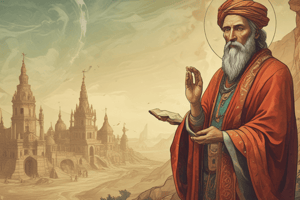Podcast
Questions and Answers
What is the primary function of religious institutions according to functionalism?
What is the primary function of religious institutions according to functionalism?
- To dictate moral laws
- To promote economic prosperity
- To create and maintain value consensus and social order (correct)
- To enforce government regulations
According to Durkheim, what is the significance of the distinction between the sacred and the profane?
According to Durkheim, what is the significance of the distinction between the sacred and the profane?
- It categorizes all aspects of human life into two rigid categories.
- It highlights the feelings of awe and respect associated with sacred objects. (correct)
- It defines the moral laws of society.
- It separates religious beliefs from economic systems.
What is the role of totems in Durkheim's analysis of religion?
What is the role of totems in Durkheim's analysis of religion?
- They represent individual beliefs rather than collective values.
- They serve as symbols of group identity and solidarity. (correct)
- They function primarily as economic tokens within the clan.
- They are arbitrary images without significant meaning.
How does Durkheim view the relationship between individual and society in the context of religion?
How does Durkheim view the relationship between individual and society in the context of religion?
What does Durkheim mean by 'collective conscience'?
What does Durkheim mean by 'collective conscience'?
What does Durkheim imply about the power of sacred symbols?
What does Durkheim imply about the power of sacred symbols?
In what context does Durkheim believe rituals function?
In what context does Durkheim believe rituals function?
What are the 'sacred' according to Durkheim?
What are the 'sacred' according to Durkheim?
How does Durkheim describe the function of rituals in society?
How does Durkheim describe the function of rituals in society?
What does Durkheim suggest about the essence of all religion through studying totemism?
What does Durkheim suggest about the essence of all religion through studying totemism?
What role does religion play in human classification according to Durkheim?
What role does religion play in human classification according to Durkheim?
According to Worsley, which criticism does he make regarding totemism?
According to Worsley, which criticism does he make regarding totemism?
What does Malinowski suggest about religion's psychological functions during uncertain outcomes?
What does Malinowski suggest about religion's psychological functions during uncertain outcomes?
In what context does Malinowski argue that religious rituals are most prominent?
In what context does Malinowski argue that religious rituals are most prominent?
What does Talcott Parsons identify as the primary source of meaning provided by religion?
What does Talcott Parsons identify as the primary source of meaning provided by religion?
How does religion create social stability, according to Parsons?
How does religion create social stability, according to Parsons?
What major issue do postmodernists like Stjepan Mestrovic raise against Durkheim's theory?
What major issue do postmodernists like Stjepan Mestrovic raise against Durkheim's theory?
Why do the Trobriand Islanders perform rituals during ocean fishing?
Why do the Trobriand Islanders perform rituals during ocean fishing?
What does Durkheim suggest about religion's impact on categories such as time and space?
What does Durkheim suggest about religion's impact on categories such as time and space?
What is the outcome of religion's role during life crises according to Malinowski?
What is the outcome of religion's role during life crises according to Malinowski?
What do substantive definitions of religion primarily focus on?
What do substantive definitions of religion primarily focus on?
Which of the following is a criticism of substantive definitions?
Which of the following is a criticism of substantive definitions?
Functional definitions of religion emphasize which aspect?
Functional definitions of religion emphasize which aspect?
What is a potential downside of functional definitions of religion?
What is a potential downside of functional definitions of religion?
How do social constructionist definitions of religion differ from other definitions?
How do social constructionist definitions of religion differ from other definitions?
What is a key focus of social constructionist approaches to religion?
What is a key focus of social constructionist approaches to religion?
According to the functionalist perspective, what role does religion serve in society?
According to the functionalist perspective, what role does religion serve in society?
Alan Aldridge's example of Scientology illustrates which concept regarding religion?
Alan Aldridge's example of Scientology illustrates which concept regarding religion?
Why might functional definitions of religion be considered more inclusive?
Why might functional definitions of religion be considered more inclusive?
What aspect does Max Weber's substantive definition of religion focus on?
What aspect does Max Weber's substantive definition of religion focus on?
Flashcards are hidden until you start studying
Study Notes
Definitions of Religion
- Three primary sociological definitions: substantive, functional, and social constructionist.
Substantive Definitions
- Focus on the core beliefs of religion, such as belief in God or the supernatural.
- Max Weber defines religion as belief in a superior power beyond scientific explanation.
- Substantive definitions are exclusive and consider only beliefs involving God as religion.
- Criticized for Western bias, excluding religions like Buddhism, which do not fit the traditional notion of a deity.
Functional Definitions
- Define religion by the social or psychological roles it plays in society.
- Emile Durkheim emphasizes the role of religion in social integration, rather than specific beliefs.
- Milton Yinger focuses on religion's answers to ultimate questions, like life's meaning and death.
- Functional definitions are inclusive, accommodating a variety of beliefs and practices.
- Limitations include conflating integration with religion, e.g., collective chanting at sports events.
Social Constructionist Definitions
- Interpretivist approach that examines how society members perceive and define religion.
- Argue against a universal definition, highlighting that meanings of religion vary among individuals and groups.
- Alan Aldridge illustrates contested definitions, such as Scientology's varying recognition as a religion.
- This approach lacks generalizability due to diverse perspectives on what constitutes religion.
Functionalist Theories of Religion
- Society seen as a complex system of interrelated parts, including religious institutions.
- Religion contributes to societal stability by fulfilling fundamental needs.
Durkheim's Perspective
- Central role of religions in fostering value consensus, order, and social solidarity.
Sacred and Profane
- Durkheim distinguishes between sacred (forbidden, awe-inspiring) and profane (ordinary, non-significant) elements in all religions.
- Religion encompasses rituals that connect the collective to the sacred, serving social cohesion.
- Worshipping sacred symbols correlates to expressing reverence for society itself.
Totemism
- Durkheim analyzes clan societies, such as the Arunta, noting totemism as a foundational aspect of religion.
- Totemic rituals symbolize group solidarity and identity, reinforcing societal connection and dependence.
Collective Conscience
- Represents shared norms and values necessary for social cohesion; maintained through regular rituals.
- Shared religious practices strengthen individual identity linked to a moral community and society.
Cognitive Functions of Religion
- Religion provides essential cognitive frameworks, influencing notions of time, space, and causality.
- According to Durkheim, it serves as the foundation of human thought, reason, and science development.
Criticisms of Durkheim's Theory
- Evidence on totemism is regarded as unreliable; distinctions between sacred and profane are fluid.
- Limited application to modern societies with multiple conflicting religious communities.
- Postmodern critiques indicate that increasing diversity has disrupted the collective conscience, negating a unified value system.
Psychological Functions of Religion
- Bronislaw Malinowski highlights religion's role in promoting emotional stability and social unity.
- Distinguishes two scenarios where religion alleviates anxiety:
- Uncertain outcomes: Rituals in risky situations, like ocean fishing, provide a sense of control and comfort.
- Life crises: Rituals associated with significant life events (birth, marriage, death) help individuals cope with disruptions.
Parsons: Religion's Role in Society
- Talcott Parsons builds on Malinowski, identifying religion's functions in modernity:
- Legitimation of central societal values: Sacralizing core values fosters value consensus and societal stability.
- Source of meaning: Religion answers existential questions, promoting understanding of suffering and mortality, despite potential undermining of justice and social values.
Studying That Suits You
Use AI to generate personalized quizzes and flashcards to suit your learning preferences.




